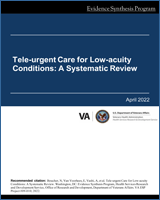This publication is in the public domain and is therefore without copyright. All text from this work may be reprinted freely. Use of these materials should be acknowledged.
NCBI Bookshelf. A service of the National Library of Medicine, National Institutes of Health.
Boucher N, Van Voorhees E, Vashi A, et al. Tele-urgent Care for Low-acuity Conditions: A Systematic Review. Washington (DC): Department of Veterans Affairs (US); 2022 Apr.
The VA Evidence Synthesis Program (ESP) was established in 2007 to provide timely and accurate syntheses of targeted health care topics of importance to clinicians, managers, and policymakers as they work to improve the health and health care of Veterans. These reports help:
- Develop clinical policies informed by evidence;
- Implement effective services to improve patient outcomes and to support VA clinical practice guidelines and performance measures; and
- Set the direction for future research to address gaps in clinical knowledge.
The program comprises four ESP Centers across the US and a Coordinating Center located in Portland, Oregon. Center Directors are VA clinicians and recognized leaders in the field of evidence synthesis with close ties to the AHRQ Evidence-based Practice Center Program. The Coordinating Center was created to manage program operations, ensure methodological consistency and quality of products, interface with stakeholders, and address urgent evidence needs. To ensure responsiveness to the needs of decision-makers, the program is governed by a Steering Committee composed of health system leadership and researchers. The program solicits nominations for review topics several times a year via the program website.
The present report was developed in response to a request from Department of Emergency Medicine (Specialty Services). The scope was further developed with input from Operational Partners (below), the ESP Coordinating Center, the review team, and the technical expert panel (TEP). The ESP consulted several technical and content experts in designing the research questions and review methodology. In seeking broad expertise and perspectives, divergent and conflicting opinions are common and perceived as healthy scientific discourse that results in a thoughtful, relevant systematic review. Ultimately, however, research questions, design, methodologic approaches, and/or conclusions of the review may not necessarily represent the views of individual technical and content experts.
- PREFACE - Tele-urgent Care for Low-acuity Conditions: A Systematic ReviewPREFACE - Tele-urgent Care for Low-acuity Conditions: A Systematic Review
- SRA051990 (12)SRA
- PDCD6 programmed cell death 6 [Homo sapiens]PDCD6 programmed cell death 6 [Homo sapiens]Gene ID:10016Gene
- 10016[uid] AND (alive[prop]) (1)Gene
Your browsing activity is empty.
Activity recording is turned off.
See more...
